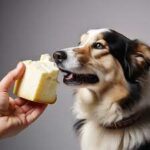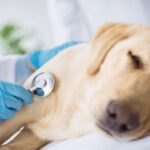Can Dogs Eat Sauerkraut?
Sauerkraut is a type of fermented cabbage that is popular in some cuisines, especially German and Eastern European. It has a sour and tangy taste that some people love and others hate. But what about dogs? Can dogs eat sauerkraut safely, or is it harmful to them?
The answer is yes, dogs can eat sauerkraut, but only in small amounts and with some precautions. Sauerkraut can offer some health benefits for dogs, but it can also pose some risks if not fed properly. Here is what you need to know about sauerkraut and dogs.
Benefits of Sauerkraut for Dogs
Sauerkraut is rich in probiotics, which are beneficial bacteria that can help support a healthy digestive system in dogs. Probiotics can help prevent and treat various digestive issues, such as diarrhea, constipation, bloating, and infections. They can also boost the immune system and protect against some diseases.
Sauerkraut is also a good source of vitamins and minerals, such as vitamin C, vitamin K, iron, and calcium. These nutrients can help maintain your dog’s overall health and prevent deficiencies. Vitamin C, for example, can help with wound healing, collagen synthesis, and immune function. Vitamin K, on the other hand, can help with blood clotting and bone health.
Sauerkraut also contains antioxidants, which are substances that can fight free radicals and prevent oxidative damage to the cells. Antioxidants can help prevent or delay some aging-related diseases, such as cancer, arthritis, and cognitive decline.
Sauerkraut also provides some fiber, which can help regulate your dog’s bowel movements and prevent constipation. Fiber can also help lower cholesterol and blood sugar levels, and promote a feeling of fullness.
Risks of Sauerkraut for Dogs
Sauerkraut is not without its drawbacks, however. One of the main risks of sauerkraut for dogs is its high sodium content. Sodium is essential for your dog’s health, but too much of it can cause dehydration, high blood pressure, kidney problems, and even salt poisoning. The recommended daily intake of sodium for dogs is about 10 mg per pound of body weight. A cup of sauerkraut can contain up to 900 mg of sodium, which is way too much for a small or medium-sized dog.
Another risk of sauerkraut for dogs is the presence of caraway seeds, which are sometimes added to sauerkraut for flavor. Caraway seeds are toxic to dogs and can cause gastrointestinal upset, liver damage, and seizures. If you are feeding your dog sauerkraut, make sure it does not contain any caraway seeds or other spices that could be harmful to your dog.
A third risk of sauerkraut for dogs is gas. Sauerkraut is a fermented food that can produce gas in the digestive tract, especially if your dog is not used to it. This can cause flatulence, bloating, and discomfort for your dog. It can also make your dog less likely to eat sauerkraut again in the future.
How to Feed Sauerkraut to Dogs
If you want to feed sauerkraut to your dog, here are some tips to follow:
- Choose homemade or organic sauerkraut. Homemade sauerkraut is the best option for your dog, as you can control the ingredients and the amount of salt. Organic sauerkraut is also preferable, as it does not contain any pesticides or preservatives that could be harmful to your dog. Avoid store-bought sauerkraut that is pasteurized, as it loses most of its probiotic benefits.
- Avoid additives and spices. As mentioned above, caraway seeds and other spices can be toxic to dogs. Sauerkraut can also contain other additives, such as sugar, vinegar, or wine, that are not necessary or beneficial for your dog. Stick to plain sauerkraut that only contains cabbage and salt.
- Feed in moderation. Sauerkraut should not be a staple in your dog’s diet, but rather a occasional treat or supplement. A small amount of sauerkraut, such as a teaspoon or a tablespoon, can be enough to provide some health benefits for your dog. Do not feed more than 10% of your dog’s daily calories from treats, including sauerkraut.
- Monitor your dog’s reaction. Some dogs may love sauerkraut, while others may hate it or be indifferent to it. Some dogs may also have allergic reactions or digestive issues from sauerkraut. Observe your dog’s behavior and stool after feeding sauerkraut, and stop if you notice any signs of discomfort, such as vomiting, diarrhea, itching, or swelling.
Conclusion
Sauerkraut can be a healthy and tasty treat for your dog, as long as you feed it in small amounts and with some precautions. Sauerkraut can provide some probiotics, vitamins, minerals, antioxidants, and fiber for your dog, but it can also cause some problems, such as sodium, caraway seeds, and gas. Choose homemade or organic sauerkraut, avoid additives and spices, feed in moderation, and monitor your dog’s reaction. If you are unsure about feeding sauerkraut to your dog, consult your veterinarian first.
FAQS
Q: Is it OK for a dog to eat sauerkraut?
Q: What fermented foods can dogs eat?
Q: Is canned sauerkraut safe?
Q: Who should not eat fermented sauerkraut?
Q: Can dogs eat sauerkraut every day?
No, dogs should not eat sauerkraut every day, as it can cause excessive sodium intake and gas. Sauerkraut should be fed as an occasional treat or supplement, not as a regular part of your dog’s diet.
Q: How much sauerkraut can I give my dog?
The amount of sauerkraut you can give your dog depends on your dog’s size, weight, and health condition. As a general rule, you can give your dog about a teaspoon or a tablespoon of sauerkraut per 10 pounds of body weight. Do not exceed 10% of your dog’s daily calories from treats, including sauerkraut.
Q: Can puppies eat sauerkraut?
Yes, puppies can eat sauerkraut, but only in very small amounts and with caution. Puppies have more sensitive digestive systems than adult dogs, and they may not tolerate sauerkraut well. Introduce sauerkraut gradually to your puppy, and watch for any signs of adverse reactions, such as vomiting, diarrhea, or loss of appetite.
Q: Can dogs eat sauerkraut juice?
Yes, dogs can drink sauerkraut juice, but only in small amounts and occasionally. Sauerkraut juice contains the same probiotics, vitamins, minerals, antioxidants, and fiber as sauerkraut, but it also has the same risks of sodium, caraway seeds, and gas. Do not give your dog more than a few teaspoons of sauerkraut juice at a time, and dilute it with water if possible.
Q: What are some alternatives to sauerkraut for dogs?
If you are looking for some alternatives to sauerkraut for dogs, you can try other fermented foods, such as yogurt, kefir, or kimchi. These foods also have probiotics and other health benefits for dogs, but they may have different tastes and textures. You can also give your dog some fresh or cooked vegetables, such as carrots, broccoli, or green beans, which are rich in fiber and antioxidants. Always check the ingredients and avoid any foods that are toxic or harmful to dogs, such as garlic, onion, grapes, raisins, chocolate, or xylitol.
Related Posts
Are Dogs Allowed In CVS?
March 22, 2024• Dog
Are Dogs Allowed in Duane Reade?
March 22, 2024• Dog
Natural Dewormers for Dogs: Safe and Effective
March 15, 2024• Dog, Dog Health
How Do I Comfort My Dog After Neutering?
March 6, 2024• Dog, Dog Health
Dog Rubs Face on Carpet: A Guide to Why
March 5, 2024• Dog














